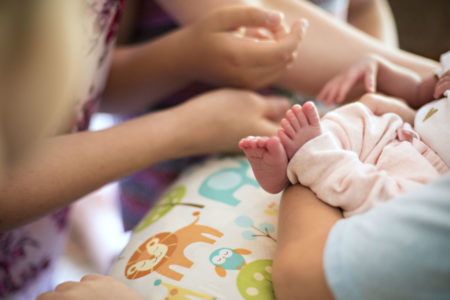The question caught me off-guard, although I’m not sure why. We’ve done a lot of adoption homestudies over the years. We’ve had to answer deeply personal and invasive questions. The topic of our infertility diagnosis has been addressed and readdressed multiple times. And here I am again. In my forties. With eight children. Explaining the “resolution of our infertility issues.”
Sometimes I wish my brain worked like my husband’s brain does. I glanced at his answer and he simply said, “We don’t have infertility issues.” He’s not wrong. We’ve been pregnant four times. We have two healthy biological children. We are not trying to get pregnant and struggling with the emotions of not being successful. But somehow that infertility label we acquired almost twenty years ago still packs an emotional punch.
The question makes me feel defensive. Have we resolved those issues? What does “resolved” even mean? Is it possible to forget the decade of grief? The invasive tests? The expensive treatments? The pained expression on the woman’s face who is about to give you some bad news from your ultrasound? The insensitive comments from strangers? The well-meaning questions from friends? The baby showers you left in tears and the Mother’s Day church services you left in anger? The decision to no longer pursue treatments and just live with the broken bodies that have failed you time and time again?
Is this all resolved?

Infertility doesn’t feel like something you go through. It feels like something you become. It fundamentally changes your relationship to your spouse, your friends, the medical community, with God, and even (and most especially and intimately) with your own body. Adoption doesn’t fix that. Pregnancy doesn’t even fix that. You will forever be impacted by that reality.
The myths you’ve told yourself since you were young suddenly come untrue with some basic tests and lab results. No, pregnancy won’t be easy or accidental. No, you won’t have a bunch of biological kids all in a row. No, the plans you made and dreams you had will not be coming true. You can cry, you can beg, you can pray, but what you thought would be beautiful and simple is now complex. The joy is sucked out of it. Your life will now revolve around 28 day cycles and charts and meds and late night fears about how you’ll afford it. Twenty years later and when I hear about a large amount of money, my brain still immediately converts that to how many adoptions that would mean, or how many cycles of medically assisted pregnancy attempts. Twenty years later and I’m still internally charting. Twenty years later and it still strikes me as a miracle that women get pregnant when they want to without any thought about having to plan or document or ask for help. . . it strikes me as a miracle on my good days. On bad days, it strikes me as deeply unfair.
And I know that’s ridiculous. I have eight children in my home. I have experienced successful pregnancies twice. I have brought the tiniest babies home from the hospital over and over. I have been given the gift of first smiles and first steps and been called “Mama” in a way that healed me to my core. I am a mother and I am unspeakably thankful.
But infertility changed me. Forever.
Life is not fair. Women unprepared for pregnancy will become pregnant. Women who have done everything “right” that should earn them a pregnancy will grieve month after month. It doesn’t make sense. And I’m forever thankful that I’ve had to learn that lesson.
I was not in control of when children came into my family. I have had to relinquish that idea. My plan. . . it was not the right one. My little family of kids who look like me was not what God had in mind for me. His plan was better. Pregnancy is not a reward for good behavior and infertility is not a punishment. Infertility is a door to a room you don’t want to go in, but you have to. You sit and you wait. You feel cold and alone. You feel angry and bitter. And then one day, a new door opens and you walk through it, into the plan God had for you. (Or maybe like me, you did not sit quietly and wait for that door to open– you were beating on it, you made elaborate plans for how to remove the hinges, you did your best to set fire to it, and then it opened.) The timing isn’t yours. But it’s right. The outcome might be adoption or foster care or a pregnancy or childlessness or spiritual mothering through investing in others. When that door opens, you walk through. But you might not get to choose what’s on the other side.
So I don’t know that my infertility issues are “resolved.” I am not the same person I was before I was touched by infertility. But I know I’m the right mom for my kids in part BECAUSE of the infertility we experienced. I’m more thankful. I’m more patient. I’m more aware that life is not fair and that’s okay. I’m more acquainted with grief and comfortable with its expression.
Maybe “resolution” isn’t what an adoption homestudy needs to ask about. Have we grieved our infertility? Have we processed it? Do we understand adoption is not an infertility cure? Yes. Is it all “resolved”? Maybe. I’m not wrestling with infertility. I’m not actively grieving it. I’m not hoping for a pregnancy. But my understanding and experience of infertility is ongoing. I think it’s “resolved” today, but how I will continue to experience that resolution in another decade? That’s an open question. One I imagine I’ll be revisiting for the rest of my life.
